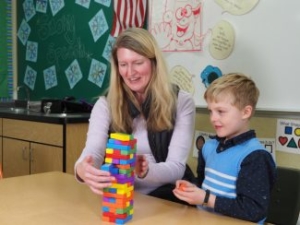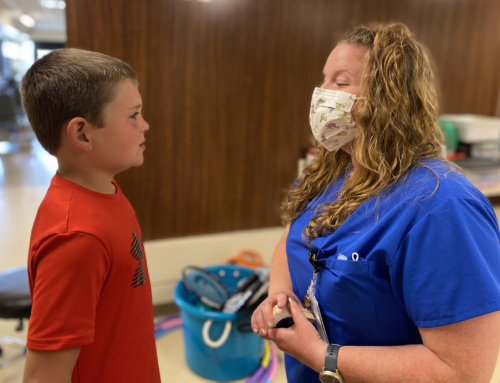Kids need active, imaginary play to develop physically, emotionally and socially
It’s advice we should all take to heart, but it’s especially important for kids: Get out and play. You may view play as simply kids messing around, but according to local occupational therapists, play is your child’s occupation — it’s what they need to do to grow and learn.
The American Occupational Therapy Association, Inc. states that play promotes physical, social and emotional wellbeing and positive mental health. It also contends that, when kids play, they learn new ways to solve problems and learn skills — competencies they need to become healthy adults.
“Just by playing, kids build a lot of strengths. It’s pretty simple,” said Tracy Perish, an occupational therapist with Memorial Regional Health, who works full time in the schools. “As long as it’s not playing with technology, everything and anything goes.”
Different play helps develop different skills. For example, to enhance hand-eye coordination, try playing catch with your kids, wrestling or having wheelbarrow and crab walk races in the yard.
Surprisingly, building core strength and stability is key to developing fine motor skills — those needed to learn handwriting in school, color, string beads and complete daily tasks such as brushing teeth.
“Coloring starts with being able to sit up. Next, children need to gain strength in their shoulders, elbows and hands. If a child can’t color, we can’t start with just their fingers. We have to go back to the core and help build that base of support,” Perish said.
Don’t get too hung up on the type of play you encourage your kids to participate in. All of it has value. For example, Legos and Connect 4 force your kids to bear weight on their joints as they play on the floor and lean to connect pieces, where playing with Playdoh, water tables and other toys with texture helps provide sensory input and develop sensory skills. Sensory skills are also enhanced by activities that demand touching, tasting, listening and smelling, such as baking, gardening and dancing to music. Perish and Jones are also fans of old fashioned games, such as hide and seek, freeze tag and good old board games.
“Sensory input helps kids conform to new situations and function in a classroom. If they are inside all day playing video games, they won’t learn how to transition to different situations,” said Susan Jones, occupational therapist with Memorial Regional Health.
In recent years, the two have noticed an upswing in children with sensory concerns, thanks to hours of sitting and playing with technology. Perish reminds parents that technology doesn’t replace play and advises foregoing technology on school nights. She believes technology is a great babysitter, but it doesn’t help kids develop skills to be successful.
“Technology is addictive and teaches kids to expect instant gratification. It seems that, if you let your kids play with technology a lot, and then you take it away, they get really needy, really fast. They end up saying they are bored, or they ask you to entertain them. The solution is limiting technology time,” Jones said.
Jones reminds parents they don’t have to always play with their kids. It’s good for kids to play alone at times, as this creates independence, enhances imagination, increases confidence and teaches children how to self-entertain and be comfortable being alone.
Regardless of what else you do today, encourage your kids to engage in imaginary, social or intellectual play. It’s as simple as pulling out a board game or chasing each other around the yard.




![Well-child checks vs. sports physicals — what’s the difference? [INFOGRAPHIC]](https://memorialregionalhealth.com/wp-content/uploads/Well-Child-Checks-vs.-Sports-Physicals-Image-500x383.jpg)
